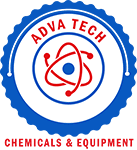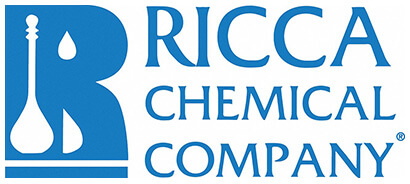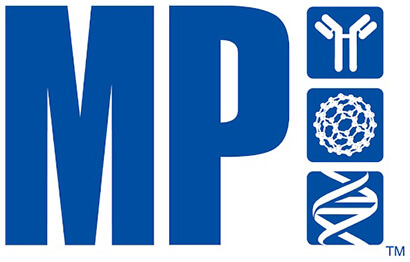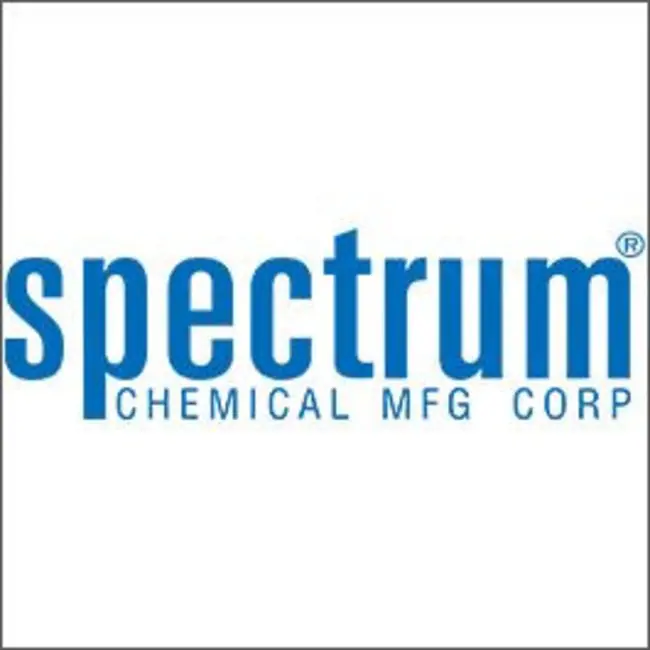GenScript Biotech
Showing 2001–2050 of 2554 results
-
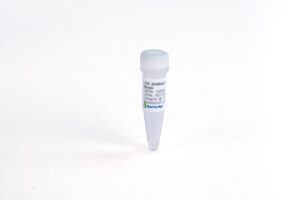
PIVKA II (2D7), mAb, Mouse
$33,292.50 Add to cart View Product DetailsProtein Induced by Vitamin K Absence or Antagonist-II (PIVKA-II), also known as Des-γ-carboxy-prothrombin (DCP), is an abnormal form of prothrombin. Normally, the prothrombin’s 10 glutamic acid residues (Glu) in the γ-carboxyglutamic acid (Gla) domain at positions 6, 7, 14, 16, 19, 20,25, 26, 29 and 32 are γ-carboxylated to Gla by vitamin-K dependent γ- glutamyl carboxylase in the liver and then secreted into plasma. In patients with hepatocellular carcinoma (HCC), γ-carboxylation of prothrombin is impaired so that PIVKA-II is formed instead of prothrombin. PIVKA-II is considered as is an efficient biomarker specific for HCC.
-

PIVKA II (6C4), mAb, Mouse
$392.44 Add to cart View Product DetailsProtein Induced by Vitamin K Absence or Antagonist-II (PIVKA-II), also known as Des-γ-carboxy-prothrombin (DCP), is an abnormal form of prothrombin. Normally, the prothrombin’s 10 glutamic acid residues (Glu) in the γ-carboxyglutamic acid (Gla) domain at positions 6, 7, 14, 16, 19, 20,25, 26, 29 and 32 are γ-carboxylated to Gla by vitamin-K dependent γ- glutamyl carboxylase in the liver and then secreted into plasma. In patients with hepatocellular carcinoma (HCC), γ-carboxylation of prothrombin is impaired so that PIVKA-II is formed instead of prothrombin. PIVKA-II is considered as is an efficient biomarker specific for HCC.
-

PIVKA II (6C4), mAb, Mouse
$3,924.38 Add to cart View Product DetailsProtein Induced by Vitamin K Absence or Antagonist-II (PIVKA-II), also known as Des-γ-carboxy-prothrombin (DCP), is an abnormal form of prothrombin. Normally, the prothrombin’s 10 glutamic acid residues (Glu) in the γ-carboxyglutamic acid (Gla) domain at positions 6, 7, 14, 16, 19, 20,25, 26, 29 and 32 are γ-carboxylated to Gla by vitamin-K dependent γ- glutamyl carboxylase in the liver and then secreted into plasma. In patients with hepatocellular carcinoma (HCC), γ-carboxylation of prothrombin is impaired so that PIVKA-II is formed instead of prothrombin. PIVKA-II is considered as is an efficient biomarker specific for HCC.
-

PIVKA II (6C4), mAb, Mouse
$33,292.50 Add to cart View Product DetailsProtein Induced by Vitamin K Absence or Antagonist-II (PIVKA-II), also known as Des-γ-carboxy-prothrombin (DCP), is an abnormal form of prothrombin. Normally, the prothrombin’s 10 glutamic acid residues (Glu) in the γ-carboxyglutamic acid (Gla) domain at positions 6, 7, 14, 16, 19, 20,25, 26, 29 and 32 are γ-carboxylated to Gla by vitamin-K dependent γ- glutamyl carboxylase in the liver and then secreted into plasma. In patients with hepatocellular carcinoma (HCC), γ-carboxylation of prothrombin is impaired so that PIVKA-II is formed instead of prothrombin. PIVKA-II is considered as is an efficient biomarker specific for HCC.
-
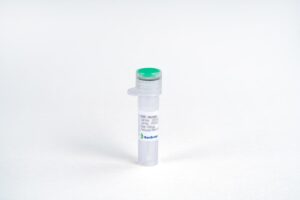
PreScission Protease
$76.76 Add to cart View Product DetailsPreScission Protease is a fusion protein of glutathione S-transferase (GST) and human rhinovirus (HRV) type 14 3C protease. The optimum recognition site for this enzyme is the sequence Leu-Glu-Val-Leu-Phe-Gln/Gly-Pro (LEVLFQ/GP) and cleavage occurs between the Gln and Gly-Pro residues. Substrate recognition and cleavage are likely to be dependent not only upon primary structural signals, but also upon the secondary and tertiary structures of the fusion protein as well.
-

PreScission Protease
$155.25 Add to cart View Product DetailsPreScission Protease is a fusion protein of glutathione S-transferase (GST) and human rhinovirus (HRV) type 14 3C protease. The optimum recognition site for this enzyme is the sequence Leu-Glu-Val-Leu-Phe-Gln/Gly-Pro (LEVLFQ/GP) and cleavage occurs between the Gln and Gly-Pro residues. Substrate recognition and cleavage are likely to be dependent not only upon primary structural signals, but also upon the secondary and tertiary structures of the fusion protein as well.
-

PreScission Protease
$1,781.06 Add to cart View Product DetailsPreScission Protease is a fusion protein of glutathione S-transferase (GST) and human rhinovirus (HRV) type 14 3C protease. The optimum recognition site for this enzyme is the sequence Leu-Glu-Val-Leu-Phe-Gln/Gly-Pro (LEVLFQ/GP) and cleavage occurs between the Gln and Gly-Pro residues. Substrate recognition and cleavage are likely to be dependent not only upon primary structural signals, but also upon the secondary and tertiary structures of the fusion protein as well.
-
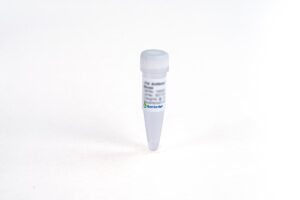
Procalcitonin (PCT) Antibody (PE9), mAb, Mouse
$127.65 Add to cart View Product DetailsPCT
is a 116 amino acid (aa) protein. It is comprised of three sections of a 57 aa
N-terminal PCT, a 32 aa calcitonin and a 21 aa katacalcin. Calcitonin is a
hormone, derived from PCT cleavage. PCT is a good diagnosis marker for
bacterial infection. Other diseases such as sepsis, inflammation, surgery, heat
shock, burn injuries and cardiogenic shock can also cause an increase of PCT
level in blood. -

Procalcitonin (PCT) Antibody (PE9), mAb, Mouse
$1,276.50 Add to cart View Product DetailsPCT
is a 116 amino acid (aa) protein. It is comprised of three sections of a 57 aa
N-terminal PCT, a 32 aa calcitonin and a 21 aa katacalcin. Calcitonin is a
hormone, derived from PCT cleavage. PCT is a good diagnosis marker for
bacterial infection. Other diseases such as sepsis, inflammation, surgery, heat
shock, burn injuries and cardiogenic shock can also cause an increase of PCT
level in blood. -

Procalcitonin (PCT) Antibody (PE9), mAb, Mouse
$10,861.46 Add to cart View Product DetailsPCT
is a 116 amino acid (aa) protein. It is comprised of three sections of a 57 aa
N-terminal PCT, a 32 aa calcitonin and a 21 aa katacalcin. Calcitonin is a
hormone, derived from PCT cleavage. PCT is a good diagnosis marker for
bacterial infection. Other diseases such as sepsis, inflammation, surgery, heat
shock, burn injuries and cardiogenic shock can also cause an increase of PCT
level in blood. -

Progesterone (5F2HC)
$230.29 Add to cart View Product DetailsThe
progesterone is a steroid hormone which is secreted by the female reproductive
systems. Its concentration is associated with the development and regression of
the corpus luteum. The progesterone is used in evaluation of ovulation status and
assessment of the luteal phase -

Progesterone (5F2HC)
$2,302.88 Add to cart View Product DetailsThe
progesterone is a steroid hormone which is secreted by the female reproductive
systems. Its concentration is associated with the development and regression of
the corpus luteum. The progesterone is used in evaluation of ovulation status and
assessment of the luteal phase -
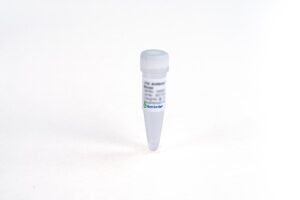
Progesterone (5F2HC)
$19,574.44 Add to cart View Product DetailsThe
progesterone is a steroid hormone which is secreted by the female reproductive
systems. Its concentration is associated with the development and regression of
the corpus luteum. The progesterone is used in evaluation of ovulation status and
assessment of the luteal phase -

ProGRP Antibody (11B5), mAb, Mouse
$281.18 Add to cart View Product DetailsProgastrin-releasing peptide (ProGRP) is a stable
precursor of the gastrin releasing peptid. It is composed of GRP (residues
1–27), a cleavage site (residues 28–30), and a constant region (residues 31–98).
ProGRP is a tumor marker for the diagnosis and monitoring of small cell lung
cancer (SCLC). -

ProGRP Antibody (11B5), mAb, Mouse
$2,811.75 Add to cart View Product DetailsProgastrin-releasing peptide (ProGRP) is a stable
precursor of the gastrin releasing peptid. It is composed of GRP (residues
1–27), a cleavage site (residues 28–30), and a constant region (residues 31–98).
ProGRP is a tumor marker for the diagnosis and monitoring of small cell lung
cancer (SCLC). -
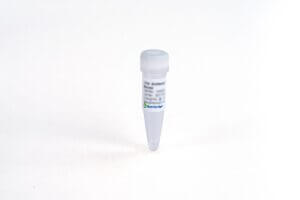
ProGRP Antibody (11B5), mAb, Mouse
$23,894.70 Add to cart View Product DetailsProgastrin-releasing peptide (ProGRP) is a stable
precursor of the gastrin releasing peptid. It is composed of GRP (residues
1–27), a cleavage site (residues 28–30), and a constant region (residues 31–98).
ProGRP is a tumor marker for the diagnosis and monitoring of small cell lung
cancer (SCLC). -

ProGRP Antibody (1C10), mAb, Mouse
$281.18 Add to cart View Product DetailsProgastrin-releasing peptide (ProGRP) is a stable
precursor of the gastrin releasing peptid. It is composed of GRP (residues
1–27), a cleavage site (residues 28–30), and a constant region (residues 31–98).
ProGRP is a tumor marker for the diagnosis and monitoring of small cell lung
cancer (SCLC). -

ProGRP Antibody (1C10), mAb, Mouse
$2,811.75 Add to cart View Product DetailsProgastrin-releasing peptide (ProGRP) is a stable
precursor of the gastrin releasing peptid. It is composed of GRP (residues
1–27), a cleavage site (residues 28–30), and a constant region (residues 31–98).
ProGRP is a tumor marker for the diagnosis and monitoring of small cell lung
cancer (SCLC). -
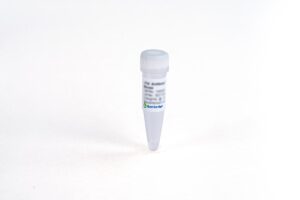
ProGRP Antibody (1C10), mAb, Mouse
$23,894.70 Add to cart View Product DetailsProgastrin-releasing peptide (ProGRP) is a stable
precursor of the gastrin releasing peptid. It is composed of GRP (residues
1–27), a cleavage site (residues 28–30), and a constant region (residues 31–98).
ProGRP is a tumor marker for the diagnosis and monitoring of small cell lung
cancer (SCLC). -
![Protein A Antibody [Biotin], mAb, Mouse](https://advatechgroup.com/wp-content/uploads/2025/06/xantibody01-300x200.jpg.pagespeed.ic.w1Wb-3Nmb1.jpg)
Protein A Antibody [Biotin], mAb, Mouse
$93.15 Add to cart View Product DetailsGenScript Protein A Antibody [Biotin], mAb, Mouse detects natural Protein A, variety of recombinant Protein A variants and MabSelect SuReTM ligand.
-
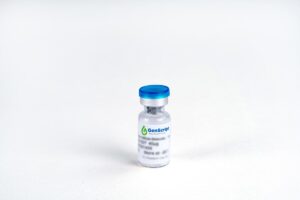
Protein A Antibody, mAb, Mouse
$90.56 Add to cart View Product DetailsGenScript Protein A Antibody, mAb, Mouse detects natural Protein A, variety of recombinant Protein A variants and MabSelect™ SuRe™ ligand.
-

Protein A ELISA Kit
$506.29 Add to cart View Product DetailsProtein A affinity chromatography is widely used for antibody purification. However, the leakage of Protein A, though covalently conjugated to chromatography supports, posts a big problem for antibody based pharmaceutical industry where false results could be generated in immunological assays from contaminated Protein A.
GenScript Protein A ELISA Kit
is developed for accurate quantification of the leakage of native Protein A, recombinant Protein A variants and MabSelect SuRe TM
in the presence or absence of antibodies. The kit offers pharmaceutical users a sensitive assay to measure mini amount of Protein A in therapeutic antibody products. It also facilitates Protein A resin manufacturers in monitoring leaching characteristics of their resins under specific conditions.Key Features:
-
Accurate detection of 20 pg/ml Protein A and 50 pg/ml MabSelect SuRe TM
in antibody preps -
Broad-range recongnition of native Protein A, recombinant Protein A variants and MabSelect SuRe
TM -
Low level deviation – Intra-assay
<5%, Inter-assay <10% - High accuracy/recovery within 85-115%
- Ready-to-use ELISA plate with fast & simple samples preparation
- Time-saving protocol – complete assay in less than 2 hours
- Exceptional lot-to-lot consistency ensured by high-quality monoclonal antibodies
- Wide applications for the quantification of Protein A contaminant and leaching
Storage:
The kit is stable for 12 months if stored at 2-8 ℃.
Do NOT freeze any component of the kit. -
Accurate detection of 20 pg/ml Protein A and 50 pg/ml MabSelect SuRe TM
-
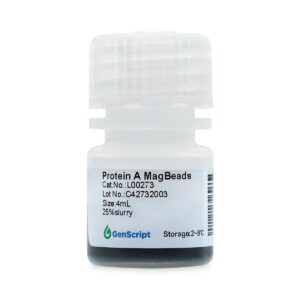
Protein A MagBeads
$79.35 Add to cart View Product DetailsGenScript Protein A MagBeads are superparamagnetic beads covalently bound with recombinant protein A for antibody purification. The beads are supplied as 25% slurry in phosphate buffered saline (PBS), pH 7.4, containing 20% ethanol. The Protein A MagBeads have a binding capacity of more than 10 mg Rabbit IgG per 1 ml settled beads (e.g. 4 ml 25% slurry).
Protein A, a bacterial cell wall protein isolated from Staphylococcus aureus, binds to mammalian IgGs, mainly through Fc regions. Native Protein A has five IgG binding domains and many unknown-function repeated sequences. Recombinant Protein A only contains five high-affinity IgG binding domains to reduce nonspecific binding.Product Details
Cat. No. Product Name Volume supplied MagBeads content L00273 Protein A MagBeads 4 ml 25% slurry -
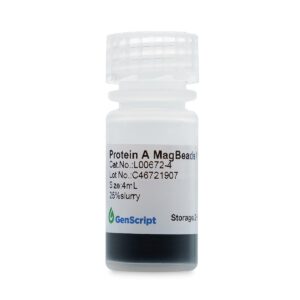
Protein A MagBeads MX
$407.96 Add to cart View Product DetailsGenScript Protein A MagBeads MX are super paramagnetic beads of average 50 μm in diameter, covalently coated with recombinant Protein A. The beads are supplied as 25% slurry in 20% ethanol. The Protein A MagBeads MX have a binding capacity of more than 30 mg human IgG per 1 ml settled beads.
Protein A, a bacterial cell wall protein isolated from Staphylococcus aureus, binds to mammalian IgGs, mainly through Fc regions. Native Protein A has five IgG binding domains and many unknown-function repeated sequences. Recombinant Protein A only contains five high-affinity IgG binding domains to reduce nonspecific binding.
Product Details
Cat. No. Product Name Volume supplied MagBeads content L00672 Protein A MagBeads MX 4 ml 25% slurry -
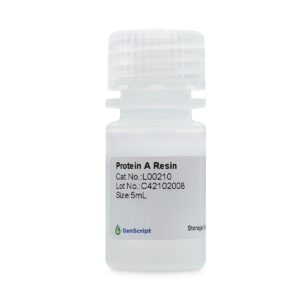
Protein A Resin
$93.15 Add to cart View Product DetailsGenScript Protein A Resin is an affinity
chromatography medium designed for easy, one-step purification of classes, subclasses
and fragments of immunoglobulins from biological fluids and from cell culture
media. Protein A Resin can also be used for immunoprecipitation of
proteins, protein complexes or antigens. The recombinant protein A ligand is
coupled to 4%
agarose. The coupling is optimized to give high binding capacity for
immunoglobulins. The static binding
capacity of Protein A Resin is greater than 20 mg human IgG/ml settled resin.
The binding capacity will
vary depending on several factors such as target antibody, flow rate etc. Table
1 lists the characteristics of Protein A Resin.Protein A, a bacterial cell wall protein isolated
from Staphylococcus
aureus,
binds to mammalian IgGs mainly through Fc regions. Native
protein A has five IgG binding domains and many other domains with unknown
functions. Recombinant protein A contains five high
affinity IgG binding domains with other non-essential domains removed to reduce nonspecific binding. Since only the Fc region
is involved in binding, the Fab region is available for binding antigens. -

Protein A Resin FF
$346.73 Add to cart View Product DetailsGenScript’s Protein A Resin FF is an affinity chromatography media designed for easy, one-step purification of classes, subclasses and fragments of immunoglobulins from biological fluids and from cell culture media. Protein A Resin FF can also be used for immunoprecipitation of proteins, protein complexes or antigens.The recombinant protein A ligand is coupled to 4% highly cross-linked agarose. The coupling is optimized to have a high binding capacity for immunoglobulins. The static binding capacity of Protein A Resin FF is greater than 40 mg rabbit IgG/ ml settled resin. The dynamic binding capacity will vary depending on several factors such as target antibody, flow rate, etc. Table 1 lists the characteristics of Protein A Resin FF.
Protein A, a bacterial cell wall protein isolated from Staphylococcus aureus, binds to mammalian IgGs mainly at their Fc region. Native protein A has five IgG binding domains and many other domains with unknown functions. Recombinant protein A contains five high affinity IgG binding domains with other non-essential domains removed to reduce nonspecific binding. Since only the Fc region is involved in binding to recombinant protein A, the Fab region is available for binding antigens.
-

Protein A Resin FF Prepacked Column
$216.49 Add to cart View Product DetailsGenScript Protein A Resin FF is an affinity chromatography media designed for easy, one-step purification of classes, subclasses and fragments of immunoglobulins from biological fluids and from cell culture media. Protein A Resin FF can also be used for immunoprecipitation of proteins, protein complexes or antigens. The recombinant protein A ligand is coupled to 4% highly cross-linked agarose. The coupling is optimized to have a high binding capacity for immunoglobulins. The static binding capacity of Protein A Resin FF is greater than 40 mg human IgG/ ml settled resin. The dynamic binding capacity will vary depending on several factors such as target antibody, flow rate, etc. Table 1 lists the characteristics of Protein A Resin FF Prepacked Column.
Protein A, a bacterial cell wall protein isolated from Staphylococcus aureus, binds to mammalian IgGs mainly at their Fc region. Native protein A has five IgG binding domains and many other domains with unknown functions. Recombinant protein A contains five high affinity IgG binding domains with other non-essential domains removed to reduce nonspecific binding. Since only the Fc region is involved in binding to recombinant protein A, the Fab region is available for binding antigens.
Cat. No. Product Name Volume supplied Resin content L00680-12 Protein A Resin FF (1mlx2) 1mlx2 50% slurry L00680-51 Protein A Resin FF (5mlx1) 5mlx1 50% slurry L00680-55 Protein A Resin FF (5mlx5) 5mlx5 50% slurry Characteristics
Ligand Recombinant Streptococcal protein A expressed in E. coli Number of IgG binding sites per ligand 5 M.W. of ligand Approximately 34 kDa PI of ligand 5.17 Degree of substitution Approximately 5 mg protein A / ml settled resin Static binding capacity > 40 mg human IgG/ ml settled resin Matrix component Agarose, 4% highly cross-linked Average particle size 90 μm (45-165 μm) Storage solution 20% ethanol Storage conditions 2-8 °C Shelf life 18 months when stored unopened Column compatibility
The 5 mL and 1 mL columns are compatible with ÄKTA™ chromatography systems. Additional adaptors may be needed for other systems. The optimal flow rate is 1 mL/min for the 1 mL column, and 5 mL/min for the 5 mL column. For preserving the column integrity, please do not exceed a flow rate of 4 mL/min for the 1 mL column and 15 mL/min for the 5 mL column (The mobile phase of the test is aqueous buffers at room temperature and the alarm pressure is 0.3 MPa). -

Protein A Resin FF Prepacked Column
$401.06 Add to cart View Product DetailsGenScript Protein A Resin FF is an affinity chromatography media designed for easy, one-step purification of classes, subclasses and fragments of immunoglobulins from biological fluids and from cell culture media. Protein A Resin FF can also be used for immunoprecipitation of proteins, protein complexes or antigens. The recombinant protein A ligand is coupled to 4% highly cross-linked agarose. The coupling is optimized to have a high binding capacity for immunoglobulins. The static binding capacity of Protein A Resin FF is greater than 40 mg human IgG/ ml settled resin. The dynamic binding capacity will vary depending on several factors such as target antibody, flow rate, etc. Table 1 lists the characteristics of Protein A Resin FF Prepacked Column.
Protein A, a bacterial cell wall protein isolated from Staphylococcus aureus, binds to mammalian IgGs mainly at their Fc region. Native protein A has five IgG binding domains and many other domains with unknown functions. Recombinant protein A contains five high affinity IgG binding domains with other non-essential domains removed to reduce nonspecific binding. Since only the Fc region is involved in binding to recombinant protein A, the Fab region is available for binding antigens.
Cat. No. Product Name Volume supplied Resin content L00680-12 Protein A Resin FF (1mlx2) 1mlx2 50% slurry L00680-51 Protein A Resin FF (5mlx1) 5mlx1 50% slurry L00680-55 Protein A Resin FF (5mlx5) 5mlx5 50% slurry Characteristics
Ligand Recombinant Streptococcal protein A expressed in E. coli Number of IgG binding sites per ligand 5 M.W. of ligand Approximately 34 kDa PI of ligand 5.17 Degree of substitution Approximately 5 mg protein A / ml settled resin Static binding capacity > 40 mg human IgG/ ml settled resin Matrix component Agarose, 4% highly cross-linked Average particle size 90 μm (45-165 μm) Storage solution 20% ethanol Storage conditions 2-8 °C Shelf life 18 months when stored unopened Column compatibility
The 5 mL and 1 mL columns are compatible with ÄKTA™ chromatography systems. Additional adaptors may be needed for other systems. The optimal flow rate is 1 mL/min for the 1 mL column, and 5 mL/min for the 5 mL column. For preserving the column integrity, please do not exceed a flow rate of 4 mL/min for the 1 mL column and 15 mL/min for the 5 mL column (The mobile phase of the test is aqueous buffers at room temperature and the alarm pressure is 0.3 MPa). -

Protein A Resin FF Prepacked Column
$1,796.59 Add to cart View Product DetailsGenScript Protein A Resin FF is an affinity chromatography media designed for easy, one-step purification of classes, subclasses and fragments of immunoglobulins from biological fluids and from cell culture media. Protein A Resin FF can also be used for immunoprecipitation of proteins, protein complexes or antigens. The recombinant protein A ligand is coupled to 4% highly cross-linked agarose. The coupling is optimized to have a high binding capacity for immunoglobulins. The static binding capacity of Protein A Resin FF is greater than 40 mg human IgG/ ml settled resin. The dynamic binding capacity will vary depending on several factors such as target antibody, flow rate, etc. Table 1 lists the characteristics of Protein A Resin FF Prepacked Column.
Protein A, a bacterial cell wall protein isolated from Staphylococcus aureus, binds to mammalian IgGs mainly at their Fc region. Native protein A has five IgG binding domains and many other domains with unknown functions. Recombinant protein A contains five high affinity IgG binding domains with other non-essential domains removed to reduce nonspecific binding. Since only the Fc region is involved in binding to recombinant protein A, the Fab region is available for binding antigens.
Cat. No. Product Name Volume supplied Resin content L00680-12 Protein A Resin FF (1mlx2) 1mlx2 50% slurry L00680-51 Protein A Resin FF (5mlx1) 5mlx1 50% slurry L00680-55 Protein A Resin FF (5mlx5) 5mlx5 50% slurry Characteristics
Ligand Recombinant Streptococcal protein A expressed in E. coli Number of IgG binding sites per ligand 5 M.W. of ligand Approximately 34 kDa PI of ligand 5.17 Degree of substitution Approximately 5 mg protein A / ml settled resin Static binding capacity > 40 mg human IgG/ ml settled resin Matrix component Agarose, 4% highly cross-linked Average particle size 90 μm (45-165 μm) Storage solution 20% ethanol Storage conditions 2-8 °C Shelf life 18 months when stored unopened Column compatibility
The 5 mL and 1 mL columns are compatible with ÄKTA™ chromatography systems. Additional adaptors may be needed for other systems. The optimal flow rate is 1 mL/min for the 1 mL column, and 5 mL/min for the 5 mL column. For preserving the column integrity, please do not exceed a flow rate of 4 mL/min for the 1 mL column and 15 mL/min for the 5 mL column (The mobile phase of the test is aqueous buffers at room temperature and the alarm pressure is 0.3 MPa). -
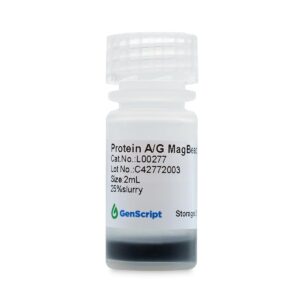
Protein A/G MagBeads
$131.96 Add to cart View Product DetailsGenScript Protein A/G MagBeads are superparamagnetic beads covalently bound with recombinant proteins A and G for antibody purification. The beads are supplied as 25% slurry in phosphate buffered saline (PBS), pH 7.4, containing 20% ethanol. The Protein A/G MagBeads have a binding capacity of more than 10 mg Goat IgG per 1 ml settled beads.
Protein A/G is a genetically engineered protein (MW ≈43 kDa) that combines the IgG binding sites of both Protein A and Protein G. 6×His-tag was attached to its N-terminal to facilitate the purification. The secreted Protein A/G contains four Fc-binding domains from Protein A and two from Protein G, making it a more universal tool to bind and purify immunoglobulins.Product Details
Cat. No. Product Name Volume supplied MagBeads content L00277 Protein A/G MagBeads 2 ml 25% slurry -
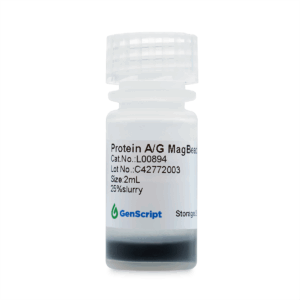
Protein A/G Magbeads MX
$628.76 Add to cart View Product DetailsThe
GenScript Protein A/G MagBeads MX are ideal for small‐scale purification of antibodies
from plasma, serum, ascites, and cell
culture.The
Protein A/G is a genetically engineered protein (MW≈43 kDa) that combines the
IgG binding sites of both Protein A and Protein G. It contains four Fc‐binding
domains from Protein A and two from Protein G, making it a universal tool to
bind and purify immunoglobulins (IgGs). GenScript’s Protein A/G MagBeads MX have
Protein A/G pre-coupled on the surface of superparamagnetic beads. To purify
antibodies, a sample containing the antibody of interest is incubated with the Protein
A/G MagBeads MX. The antibody binds to the Protein A/G on the beads during a
short incubation. This is followed by washing the beads to remove
non-specifically bound materials, and eluting the purified antibody. Magnetic
separation simplify purification process by eliminating the need for
centrifugation, minimizes sample loss and removes the excessive steps of a traditional
centrifugation-based purification method. -

Protein A/G Magbeads MX
$139.73 Add to cart View Product DetailsThe
GenScript Protein A/G MagBeads MX are ideal for small‐scale purification of antibodies
from plasma, serum, ascites, and cell
culture.The
Protein A/G is a genetically engineered protein (MW≈43 kDa) that combines the
IgG binding sites of both Protein A and Protein G. It contains four Fc‐binding
domains from Protein A and two from Protein G, making it a universal tool to
bind and purify immunoglobulins (IgGs). GenScript’s Protein A/G MagBeads MX have
Protein A/G pre-coupled on the surface of superparamagnetic beads. To purify
antibodies, a sample containing the antibody of interest is incubated with the Protein
A/G MagBeads MX. The antibody binds to the Protein A/G on the beads during a
short incubation. This is followed by washing the beads to remove
non-specifically bound materials, and eluting the purified antibody. Magnetic
separation simplify purification process by eliminating the need for
centrifugation, minimizes sample loss and removes the excessive steps of a traditional
centrifugation-based purification method. -

Protein A/G Magbeads MX
$2,962.69 Add to cart View Product DetailsThe
GenScript Protein A/G MagBeads MX are ideal for small‐scale purification of antibodies
from plasma, serum, ascites, and cell
culture.The
Protein A/G is a genetically engineered protein (MW≈43 kDa) that combines the
IgG binding sites of both Protein A and Protein G. It contains four Fc‐binding
domains from Protein A and two from Protein G, making it a universal tool to
bind and purify immunoglobulins (IgGs). GenScript’s Protein A/G MagBeads MX have
Protein A/G pre-coupled on the surface of superparamagnetic beads. To purify
antibodies, a sample containing the antibody of interest is incubated with the Protein
A/G MagBeads MX. The antibody binds to the Protein A/G on the beads during a
short incubation. This is followed by washing the beads to remove
non-specifically bound materials, and eluting the purified antibody. Magnetic
separation simplify purification process by eliminating the need for
centrifugation, minimizes sample loss and removes the excessive steps of a traditional
centrifugation-based purification method. -

Protein C -Tag Antibody (HPC4), pAb, Rabbit
$87.98 Add to cart View Product DetailsThis Antibody recognizes Protein C tagged fusion proteins.
-
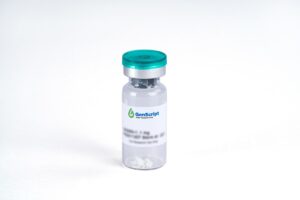
Protein G
$90.56 Add to cart View Product DetailsProtein G, a cell surface protein of group G streptococci, is a Type III Fc receptor that binds to the Fc region of IgG by a non-immune mechanism similar to that of protein A from Staphylococcus aureus. This product contains three IgG binding domains, but its albumin-binding region has been removed. Additionally, His-tag and cysteine have been added to N- and C-termini, respectively, to facilitate purification and conjugation. This does not affect the protein’s ability to bind to IgG.
-
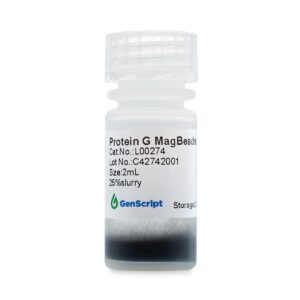
Protein G MagBeads
$111.26 Add to cart View Product DetailsGenScript Protein G MagBeads are superparamagnetic beads covalently bound with recombinant protein G for antibody purification. The beads are supplied as 25% slurry in phosphate buffered saline (PBS), pH 7.4, containing 20% ethanol. The Protein G MagBeads have a binding capacity of more than 10 mg Goat IgG per 1 ml settled beads.
Protein G, a bacterial cell wall protein isolated from group G Streptococci, binds to mammalian IgGs mainly through Fc regions. Native Protein G has three IgG binding domains and also the sites for albumin and cell-surface binding. Albumin and cell-surface binding domains have been eliminated from recombinant Protein G to reduce nonspecific binding. Protein G has greater affinity than Protein A for most mammalian IgGs, especially for certain subclasses including human IgG3, mouse IgG1 and rat IgG2a. Unlike Protein A, Protein G does not bind to human IgM, IgD and IgA.Product Details
Cat. No. Product Name Volume supplied MagBeads content L00274 Protein G MagBeads 2 ml 25% slurry -
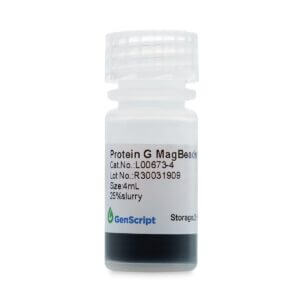
Protein G MagBeads MX
$429.53 Add to cart View Product DetailsGenScript Protein G MagBeads MX are superparamagnetic beads of average 40 μm in diameter, covalently coated with recombinant Protein G. The beads are supplied as 25% slurry in 20% ethanol. The Protein G MagBeads MX have a binding capacity of more than 25 mg Human IgG per 1 ml settled beads.
Protein G is a genetically engineered protein (MW≈22 kDa) that combines the IgG binding sites of both Protein A and Protein G. 6×His-tag was attached to its N-terminal to facilitate the purification. Protein G has greater affinity than protein A for most mammalian IgGs, especially for certain subclasses including human IgG3, mouse IgG1 and rat IgG2a. Unlike protein A, protein G does not bind to human IgM, IgD and IgA.Product Details
Cat. No. Product Name Volume supplied MagBeads content L00673 Protein G MagBeads MX 4 ml 25% slurry -
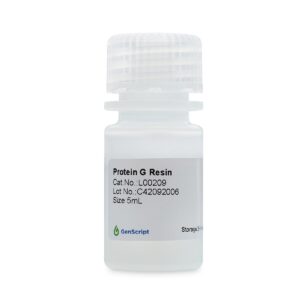
Protein G Resin
$111.26 Add to cart View Product DetailsDescription:
GenScript Protein G Resin is an affinity chromatography medium designed for easy, one-step purification of classes, subclasses and fragments of immunoglobulins from biological fluids and cell culture media. The recombinant protein G ligand is coupled to 4% highly cross-linked agarose. The static binding capacity of Protein G Resin is over 20 mg sheep IgG/ml settled resin. The dynamic binding capacity will vary depending on several factors such as target antibody, flow rate etc.
Protein G, a bacterial cell wall protein isolated from group G Streptococci, binds to mammalian IgGs mainly through Fc regions. Native protein G has 3 IgG binding domains and also sites for albumin and cell-surface binding. The latter have been eliminated from recombinant protein G to reduce nonspecific binding. Although protein G has very similar tertiary structures to protein A, their amino acid compositions differ significantly, resulting in different binding characteristics. Protein G can be used for purification of mammalian monoclonal and polyclonal IgGs that do not bind well to protein A. Protein G has greater affinity than protein A for most mammalian IgGs, especially for certain subclasses including human IgG3, mouse IgG1 and rat IgG2a. Unlike protein A, protein G does not bind to human IgM, IgD and IgA.
Total Volume:
5 ml settled resin (10 ml 50% slurry)
-

Protein G Resin FF
$1,905.26 Add to cart View Product DetailsGenScript Protein G Resin FF is an affinity chromatography medium designed for easy, one-step purification of classes, subclasses and fragments of immunoglobulins from biological fluids and from cell culture media. The recombinant protein G ligand is coupled to 4% highly cross-linked agarose. The static binding capacity of Protein G Resin FF is greater than 20 mg human IgG/ml settled resin. The dynamic binding capacity will vary depending on several factors such as target antibody, flow rate etc. Table 1 lists the characteristics of Protein G Resin FF.
Protein G, a bacterial cell wall protein isolated from group G Streptococci, binds to mammalian IgGs mainly through Fc regions. Native protein G has 3 IgG binding domains and also sites for albumin and cell-surface binding. The latter have been eliminated from recombinant protein G to reduce nonspecific binding. Although protein G has very similar tertiary structures to protein A, their amino acid compositions differ significantly, resulting in different binding characteristics. Protein G can be used for purification of mammalian monoclonal and polyclonal IgGs that do not bind well to protein A. Protein G has greater affinity than protein A for most mammalian IgGs, especially for certain subclasses including human IgG3, mouse IgG1 and rat IgG2a. Unlike protein A, protein G does not bind to human IgM, IgD and IgA.Cat. No. Product Name Volume supplied Resin content L00664-5 Protein G Resin FF (5ml) 10ml 50% slurry L00664-25 Protein G Resin FF (25ml) 50ml 50% slurry L00664-100 Protein G Resin FF (100ml) 200ml 50% slurry Storage
Store in 20% ethanol at 2°C to 8°C. Do not freeze.Characteristics
Ligand Recombinant Streptococcal protein G lacking the albumin-binding sites expressed in E. coli Number of IgG binding sites per ligand 3 M.W. of ligand Approximately 22 kDa PI of ligand 4.69 Degree of substitution Approximately 2 mg protein G/ml settled resin Static binding capacity ≥ 20 mg human IgG/ml settled resin Matrix spherical 4% highly cross-linked agarose Average particle size 90 μm (45-165 μm) Recommended flow rate 50-300cm/h Storage solution 20% ethanol Storage and Stability 18 months when stored unopened at 2-8 °C -

Protein G Resin FF
$1,270.46 Add to cart View Product DetailsGenScript Protein G Resin FF is an affinity chromatography medium designed for easy, one-step purification of classes, subclasses and fragments of immunoglobulins from biological fluids and from cell culture media. The recombinant protein G ligand is coupled to 4% highly cross-linked agarose. The static binding capacity of Protein G Resin FF is greater than 20 mg human IgG/ml settled resin. The dynamic binding capacity will vary depending on several factors such as target antibody, flow rate etc. Table 1 lists the characteristics of Protein G Resin FF.
Protein G, a bacterial cell wall protein isolated from group G Streptococci, binds to mammalian IgGs mainly through Fc regions. Native protein G has 3 IgG binding domains and also sites for albumin and cell-surface binding. The latter have been eliminated from recombinant protein G to reduce nonspecific binding. Although protein G has very similar tertiary structures to protein A, their amino acid compositions differ significantly, resulting in different binding characteristics. Protein G can be used for purification of mammalian monoclonal and polyclonal IgGs that do not bind well to protein A. Protein G has greater affinity than protein A for most mammalian IgGs, especially for certain subclasses including human IgG3, mouse IgG1 and rat IgG2a. Unlike protein A, protein G does not bind to human IgM, IgD and IgA.Cat. No. Product Name Volume supplied Resin content L00664-5 Protein G Resin FF (5ml) 10ml 50% slurry L00664-25 Protein G Resin FF (25ml) 50ml 50% slurry L00664-100 Protein G Resin FF (100ml) 200ml 50% slurry Storage
Store in 20% ethanol at 2°C to 8°C. Do not freeze.Characteristics
Ligand Recombinant Streptococcal protein G lacking the albumin-binding sites expressed in E. coli Number of IgG binding sites per ligand 3 M.W. of ligand Approximately 22 kDa PI of ligand 4.69 Degree of substitution Approximately 2 mg protein G/ml settled resin Static binding capacity ≥ 20 mg human IgG/ml settled resin Matrix spherical 4% highly cross-linked agarose Average particle size 90 μm (45-165 μm) Recommended flow rate 50-300cm/h Storage solution 20% ethanol Storage and Stability 18 months when stored unopened at 2-8 °C -
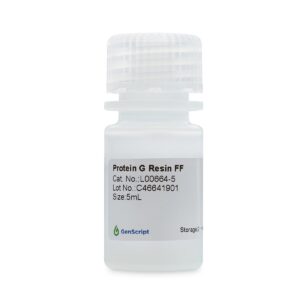
Protein G Resin FF
$369.15 Add to cart View Product DetailsGenScript Protein G Resin FF is an affinity chromatography medium designed for easy, one-step purification of classes, subclasses and fragments of immunoglobulins from biological fluids and from cell culture media. The recombinant protein G ligand is coupled to 4% highly cross-linked agarose. The static binding capacity of Protein G Resin FF is greater than 20 mg human IgG/ml settled resin. The dynamic binding capacity will vary depending on several factors such as target antibody, flow rate etc. Table 1 lists the characteristics of Protein G Resin FF.
Protein G, a bacterial cell wall protein isolated from group G Streptococci, binds to mammalian IgGs mainly through Fc regions. Native protein G has 3 IgG binding domains and also sites for albumin and cell-surface binding. The latter have been eliminated from recombinant protein G to reduce nonspecific binding. Although protein G has very similar tertiary structures to protein A, their amino acid compositions differ significantly, resulting in different binding characteristics. Protein G can be used for purification of mammalian monoclonal and polyclonal IgGs that do not bind well to protein A. Protein G has greater affinity than protein A for most mammalian IgGs, especially for certain subclasses including human IgG3, mouse IgG1 and rat IgG2a. Unlike protein A, protein G does not bind to human IgM, IgD and IgA.Cat. No. Product Name Volume supplied Resin content L00664-5 Protein G Resin FF (5ml) 10ml 50% slurry L00664-25 Protein G Resin FF (25ml) 50ml 50% slurry L00664-100 Protein G Resin FF (100ml) 200ml 50% slurry Storage
Store in 20% ethanol at 2°C to 8°C. Do not freeze.Characteristics
Ligand Recombinant Streptococcal protein G lacking the albumin-binding sites expressed in E. coli Number of IgG binding sites per ligand 3 M.W. of ligand Approximately 22 kDa PI of ligand 4.69 Degree of substitution Approximately 2 mg protein G/ml settled resin Static binding capacity ≥ 20 mg human IgG/ml settled resin Matrix spherical 4% highly cross-linked agarose Average particle size 90 μm (45-165 μm) Recommended flow rate 50-300cm/h Storage solution 20% ethanol Storage and Stability 18 months when stored unopened at 2-8 °C -

Protein G Resin FF Prepacked Column
$354.49 Add to cart View Product DetailsGenScript Protein G Resin FF is an affinity chromatography medium designed for easy, one-step purification of classes, subclasses and fragments of immunoglobulins from biological fluids and from cell culture media. The recombinant protein G ligand is coupled to 4% highly cross-linked agarose. The static binding capacity of Protein G Resin FF is greater than 20 mg human IgG/ml settled resin. The dynamic binding capacity will vary depending on several factors such as target antibody, flow rate etc. Table 1 lists the characteristics of Protein G Resin FF Prepacked Column.
Protein G, a bacterial cell wall protein isolated from group G Streptococci, binds to mammalian IgGs mainly through Fc regions. Native protein G has 3 IgG binding domains and also sites for albumin and cell-surface binding. The latter have been eliminated from recombinant protein G to reduce nonspecific binding. Although protein G has very similar tertiary structures to protein A, their amino acid compositions differ significantly, resulting in different binding characteristics. Protein G can be used for purification of mammalian monoclonal and polyclonal IgGs that do not bind well to protein A. Protein G has greater affinity than protein A for most mammalian IgGs, especially for certain subclasses including human IgG3, mouse IgG1 and rat IgG2a. Unlike protein A, protein G does not bind to human IgM, IgD and IgA.
Cat. No. Product Name Volume supplied Resin content L00681-12 Protein G Resin FF (1mlx2) 1mlx2 50% slurry L00681-51 Protein G Resin FF (5mlx1) 5mlx1 50% slurry L00681-55 Protein G Resin FF (5mlx5) 5mlx5 50% slurry Storage
Store in 20% ethanol at 2°C to 8°C. Do not freeze.
CharacteristicsLigand Recombinant Streptococcal protein G lacking the albumin-binding sites expressed in E. coli Number of IgG binding sites per ligand 3 M.W. of ligand Approximately 22 kDa PI of ligand 4.69 Degree of substitution Approximately 2 mg protein G/ml settled resin Static binding capacity ≥ 20 mg human IgG/ml settled resin Matrix spherical 4% highly cross-linked agarose Average particle size 90 μm (45-165 μm) Recommended flow rate 50-300cm/h Storage solution 20% ethanol Storage and Stability 18 months when stored unopened at 2-8 °C Column compatibility
The 5 mL and 1 mL columns are compatible with ÄKTA™ chromatography systems. Additional adaptors may be needed for other systems. The optimal flow rate is 1 mL/min for the 1 mL column, and 5 mL/min for the 5 mL column. For preserving the column integrity, please do not exceed a flow rate of 4 mL/min for the 1 mL column and 15 mL/min for the 5 mL column (The mobile phase of the test is aqueous buffers at room temperature and the alarm pressure is 0.3 MPa). -

Protein G Resin FF Prepacked Column
$656.36 Add to cart View Product DetailsGenScript Protein G Resin FF is an affinity chromatography medium designed for easy, one-step purification of classes, subclasses and fragments of immunoglobulins from biological fluids and from cell culture media. The recombinant protein G ligand is coupled to 4% highly cross-linked agarose. The static binding capacity of Protein G Resin FF is greater than 20 mg human IgG/ml settled resin. The dynamic binding capacity will vary depending on several factors such as target antibody, flow rate etc. Table 1 lists the characteristics of Protein G Resin FF Prepacked Column.
Protein G, a bacterial cell wall protein isolated from group G Streptococci, binds to mammalian IgGs mainly through Fc regions. Native protein G has 3 IgG binding domains and also sites for albumin and cell-surface binding. The latter have been eliminated from recombinant protein G to reduce nonspecific binding. Although protein G has very similar tertiary structures to protein A, their amino acid compositions differ significantly, resulting in different binding characteristics. Protein G can be used for purification of mammalian monoclonal and polyclonal IgGs that do not bind well to protein A. Protein G has greater affinity than protein A for most mammalian IgGs, especially for certain subclasses including human IgG3, mouse IgG1 and rat IgG2a. Unlike protein A, protein G does not bind to human IgM, IgD and IgA.
Cat. No. Product Name Volume supplied Resin content L00681-12 Protein G Resin FF (1mlx2) 1mlx2 50% slurry L00681-51 Protein G Resin FF (5mlx1) 5mlx1 50% slurry L00681-55 Protein G Resin FF (5mlx5) 5mlx5 50% slurry Storage
Store in 20% ethanol at 2°C to 8°C. Do not freeze.
CharacteristicsLigand Recombinant Streptococcal protein G lacking the albumin-binding sites expressed in E. coli Number of IgG binding sites per ligand 3 M.W. of ligand Approximately 22 kDa PI of ligand 4.69 Degree of substitution Approximately 2 mg protein G/ml settled resin Static binding capacity ≥ 20 mg human IgG/ml settled resin Matrix spherical 4% highly cross-linked agarose Average particle size 90 μm (45-165 μm) Recommended flow rate 50-300cm/h Storage solution 20% ethanol Storage and Stability 18 months when stored unopened at 2-8 °C Column compatibility
The 5 mL and 1 mL columns are compatible with ÄKTA™ chromatography systems. Additional adaptors may be needed for other systems. The optimal flow rate is 1 mL/min for the 1 mL column, and 5 mL/min for the 5 mL column. For preserving the column integrity, please do not exceed a flow rate of 4 mL/min for the 1 mL column and 15 mL/min for the 5 mL column (The mobile phase of the test is aqueous buffers at room temperature and the alarm pressure is 0.3 MPa). -

Protein G Resin FF Prepacked Column
$2,941.13 Add to cart View Product DetailsGenScript Protein G Resin FF is an affinity chromatography medium designed for easy, one-step purification of classes, subclasses and fragments of immunoglobulins from biological fluids and from cell culture media. The recombinant protein G ligand is coupled to 4% highly cross-linked agarose. The static binding capacity of Protein G Resin FF is greater than 20 mg human IgG/ml settled resin. The dynamic binding capacity will vary depending on several factors such as target antibody, flow rate etc. Table 1 lists the characteristics of Protein G Resin FF Prepacked Column.
Protein G, a bacterial cell wall protein isolated from group G Streptococci, binds to mammalian IgGs mainly through Fc regions. Native protein G has 3 IgG binding domains and also sites for albumin and cell-surface binding. The latter have been eliminated from recombinant protein G to reduce nonspecific binding. Although protein G has very similar tertiary structures to protein A, their amino acid compositions differ significantly, resulting in different binding characteristics. Protein G can be used for purification of mammalian monoclonal and polyclonal IgGs that do not bind well to protein A. Protein G has greater affinity than protein A for most mammalian IgGs, especially for certain subclasses including human IgG3, mouse IgG1 and rat IgG2a. Unlike protein A, protein G does not bind to human IgM, IgD and IgA.
Cat. No. Product Name Volume supplied Resin content L00681-12 Protein G Resin FF (1mlx2) 1mlx2 50% slurry L00681-51 Protein G Resin FF (5mlx1) 5mlx1 50% slurry L00681-55 Protein G Resin FF (5mlx5) 5mlx5 50% slurry Storage
Store in 20% ethanol at 2°C to 8°C. Do not freeze.
CharacteristicsLigand Recombinant Streptococcal protein G lacking the albumin-binding sites expressed in E. coli Number of IgG binding sites per ligand 3 M.W. of ligand Approximately 22 kDa PI of ligand 4.69 Degree of substitution Approximately 2 mg protein G/ml settled resin Static binding capacity ≥ 20 mg human IgG/ml settled resin Matrix spherical 4% highly cross-linked agarose Average particle size 90 μm (45-165 μm) Recommended flow rate 50-300cm/h Storage solution 20% ethanol Storage and Stability 18 months when stored unopened at 2-8 °C Column compatibility
The 5 mL and 1 mL columns are compatible with ÄKTA™ chromatography systems. Additional adaptors may be needed for other systems. The optimal flow rate is 1 mL/min for the 1 mL column, and 5 mL/min for the 5 mL column. For preserving the column integrity, please do not exceed a flow rate of 4 mL/min for the 1 mL column and 15 mL/min for the 5 mL column (The mobile phase of the test is aqueous buffers at room temperature and the alarm pressure is 0.3 MPa). -
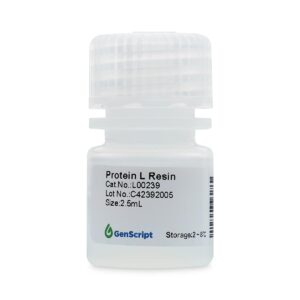
Protein L Resin
$138.00 Add to cart View Product DetailsGenScript Protein L Resin is an affinity chromatography medium designed
for easy, one-step purification of classes, subclasses and fragments of immunoglobulins from biological fluids and from cell culture media. The highly purified protein L ligand is
coupled to 4% agarose. The coupling is
optimized to give high binding capacity for immunoglobulins.
The static binding capacity of Protein L Resin is greater than 15 mg rabbit IgG/ml settled resin. The dynamic binding capacity will vary depending
on several factors such as target antibody, flow rate etc.Protein L, first isolated from the surface of
bacterial species Peptostreptoccus magnus,
binds immunoglobulin through κ light chain interaction. Protein L binds a wider
range of Ig classes and subclasses than other antibody-binding proteins such as
protein A or protein G. It can bind to all classes of Ig (i.e., IgG, IgM, IgA,
IgE, and IgD) and also the single chain variable fragments (Scfv) and Fab
fragments. -

PSA (7H2), mAb, Mouse
$104.36 Add to cart View Product DetailsProstate specific antigen (PSA) is a serine protease produced by the prostate gland. In serum, it exists in different forms, cPSA, mainly including PSA-ACT (alpha-1-antichymotrypsin) and PSA-A2M (alpha-2-macroglobulin), fPSA (free PSA), etc. The blood level of PSA is increased in men with prostate cancer and it is considered as an indicator for prostate cancer, tumor recurrence and response to therapy.
-

PSA (7H2), mAb, Mouse
$1,043.63 Add to cart View Product DetailsProstate specific antigen (PSA) is a serine protease produced by the prostate gland. In serum, it exists in different forms, cPSA, mainly including PSA-ACT (alpha-1-antichymotrypsin) and PSA-A2M (alpha-2-macroglobulin), fPSA (free PSA), etc. The blood level of PSA is increased in men with prostate cancer and it is considered as an indicator for prostate cancer, tumor recurrence and response to therapy.
-

PSA (7H2), mAb, Mouse
$8,883.75 Add to cart View Product DetailsProstate specific antigen (PSA) is a serine protease produced by the prostate gland. In serum, it exists in different forms, cPSA, mainly including PSA-ACT (alpha-1-antichymotrypsin) and PSA-A2M (alpha-2-macroglobulin), fPSA (free PSA), etc. The blood level of PSA is increased in men with prostate cancer and it is considered as an indicator for prostate cancer, tumor recurrence and response to therapy.
-

PSA (8A12), mAb, Mouse
$104.36 Add to cart View Product DetailsProstate specific antigen (PSA) is a serine protease produced by the prostate gland. In serum, it exists in different forms, cPSA, mainly including PSA-ACT (alpha-1-antichymotrypsin) and PSA-A2M (alpha-2-macroglobulin), fPSA (free PSA), etc. The blood level of PSA is increased in men with prostate cancer and it is considered as an indicator for prostate cancer, tumor recurrence and response to therapy.
-

PSA (8A12), mAb, Mouse
$1,043.63 Add to cart View Product DetailsProstate specific antigen (PSA) is a serine protease produced by the prostate gland. In serum, it exists in different forms, cPSA, mainly including PSA-ACT (alpha-1-antichymotrypsin) and PSA-A2M (alpha-2-macroglobulin), fPSA (free PSA), etc. The blood level of PSA is increased in men with prostate cancer and it is considered as an indicator for prostate cancer, tumor recurrence and response to therapy.
